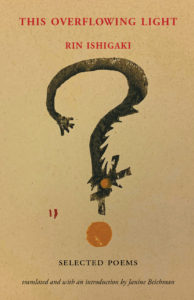 Born in central Tokyo in 1920, Rin Ishigaki was one of the most daring and gifted poets of Japan’s postwar cultural renaissance. She knew Japan before the war, during it, and afterwards, saw it move from hubris to disastrous defeat – which included the destruction of her family home during one of the worst firebombings of Tokyo in 1945 – to restoration into the community of nations. Her poetry is witness to this history as seen from her own specific viewpoint, that of a single woman working in a bank as the only support for her six-member family, at first engaged in labor union activities, but later moving to a politically more independent position. Her down-to-earth understanding of the politics of family and the workplace, helped to create her reputation as a writer of ‘life poetry’ and as a poet of resistance, but this combines with a matter-of-fact, unsentimental, and often humorous intimacy with the ordinary creatures and things of the world, whether animal, vegetable or mineral, to shed an almost other-worldly light over some of the poems, even though they speak in tones and about subjects refreshingly earthy and earthly.
Born in central Tokyo in 1920, Rin Ishigaki was one of the most daring and gifted poets of Japan’s postwar cultural renaissance. She knew Japan before the war, during it, and afterwards, saw it move from hubris to disastrous defeat – which included the destruction of her family home during one of the worst firebombings of Tokyo in 1945 – to restoration into the community of nations. Her poetry is witness to this history as seen from her own specific viewpoint, that of a single woman working in a bank as the only support for her six-member family, at first engaged in labor union activities, but later moving to a politically more independent position. Her down-to-earth understanding of the politics of family and the workplace, helped to create her reputation as a writer of ‘life poetry’ and as a poet of resistance, but this combines with a matter-of-fact, unsentimental, and often humorous intimacy with the ordinary creatures and things of the world, whether animal, vegetable or mineral, to shed an almost other-worldly light over some of the poems, even though they speak in tones and about subjects refreshingly earthy and earthly.
Janine Beichman’s skilled and deeply sympathetic translations capture Ishigaki’s breadth and depths in English, from the early postwar political poems and cries for freedom from family ties all the way to the late poems in which she contemplates her own death. ‘How else,’ she asked, ‘could you write poetry except from your own life?’
August 2022. 120 pages. 8.5 x 5.5. ISBN 978-4-907359-41-6 (paperback).
‘My house is small but the living is heavy,’ writes Ishigaki, one of Japan’s most important and widely read mid-twentieth-century poets. In this exquisitely translated collection of sometimes simple, sometimes surreal, yet always striking poems, Ishigaki struggles in her cramped corner of the world to carve out her own place as a woman, socially conscious poet, idealist, and dreamer. In the process, she lightens our load too, teaching us how to live. – Jeffrey Angles, author of Watashi no hizukehenkōsen (My International Date Line)
We were hungrily waiting for this collection of poems by one of the most important and beloved modern Japanese poets, Ishigaki Rin. Beginning with ‘Greetings’ and ending with ‘Good Night’, the collection tells us a story – sad, brutal but humorous and empowering – of a girl-daughter-mature woman, socially aware and working hard to support her dependent and ailing family while also presenting a rich feast of both celebrated poems and less well-known yet interesting, engaging, and powerful pieces: Fruits which no country / has ever grown / Splendid banquets / whose recipes no chef knows (from ‘Festival of the Blind’). – Tomoko Aoyama, author of Reading Food in Modern Japanese Literature.
If you look into the history of Japanese free verse poetry until now it’s clear that male poets, who were still the mainstream when Ishigaki was writing, had (and still have) no interest in pots or pans or toilets or the other down to earth things that Ishigaki Rin writes about. There are women poets now, including me, who write poems about such things. Different as her world was from ours, Ishigaki Rin, poet of resistance, is the mother of us all. – Ito Hiromi, author of Killing Kanoko and The Thorn Puller.
Click here to read a PDF extract from this book.
Recent reviews of This Overflowing Light:
Alice Wanderer in Rochford Street Revue: ‘Sharply observant of both the world of facticity and of our ever-present dreams and nightmares, her work is at once full of affection and absolutely unshrinking.… I highly recommend this book to anyone interested in poetry or in twentieth century Japan.’ Click here to read the full review.
Billy Mills in his blog Elliptical Movements: ‘Ishigaki brings her female perspective and acute sense of the absurd to proceedings, and, in a number of poems, also draws on her Japanese literary heritage in interestingly unselfconscious ways. In a culture with a long tradition of women poets, she represents a vital continuity.… Once again, I am indebted to Isobar for furthering my education in Japanese poetry, and this is another volume that English-speaking readers with an interest in the rest of the poetic world would do well to read’ Click here to read the whole review.
Nadine Willems in Cha: An Asian Literary Journal: ‘There appears to be some kind of communion – an affinity, a deep understanding – between Beichman and Ishigaki, which shines throughout the book. It is evident in the dense introduction, in which the translator probes with nuance, affection, and intelligence the mindset of the post-war woman-poet-worker. Beichman’s text selection is all hers, but through it we are able to trace the arc and intensity of Ishigaki’s life. The voice that emerges from the translations is luminous. It captures with ease the rhythms of the original, conveying this “dimension of existence that words could invoke” – the capacity for resilience that writing offered and that Ishigaki called “this overflowing light”.’ Click here to read the whole review.
James Garza in Reading in Translation: Janine Beichman ‘seems to approach translation as an embodied reader – a reader who does not simply “access” the text … from a position of distant mastery, but who is capable of being moved and changed by the source text, and who constructs the target text in the still “warm” affective space of that experience. The target-language words are somehow picked up and put together differently than if someone were to pick them up “cold”.’ Click here to read the whole review.
Simon Collings in Litter: ‘Janine Beichman’s translations are highly accomplished, and she also provides an excellent introduction to Ishigaki’s work, plus notes on individual texts. There’s a lot of darkness in these poems, and loneliness, but also a strong sense of a woman with an intense love of life.’ Click here to read the whole review.
Louise George Kittaka in the Japan Times: ‘Beichman, a professor emerita of Japanese literature at Daito Bunka University in Tokyo, distills the essence of Ishigaki’s down-to-earth and often witty style in This Overflowing Light, resulting in a highly readable collection with broad appeal.’ Click here to read the whole review.
Hannah Huff in Notes of Oak: ‘Any reader who hasn’t read Ishigaki Rin yet should start with this intimate collection, because her voice rises up through every page, translating the everyday and the fantastic into poetry that will both shock and comfort you.’ Click here to read the whole review.
 Takeshi Morisato has just posted an interesting podcast conversation between himself and Janine Beichman about This Overflowing Light on New Books Network. Click here to listen to the podcast.
Takeshi Morisato has just posted an interesting podcast conversation between himself and Janine Beichman about This Overflowing Light on New Books Network. Click here to listen to the podcast.
Click here to buy from Amazon in the US; click here to buy from Amazon in Japan; Click here to buy from Amazon in the UK.